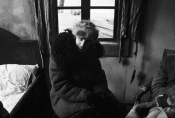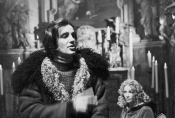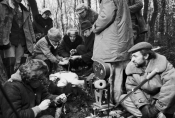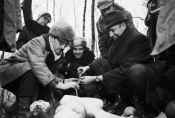Andrzej Żuławski

Film director, screenwriter, actor, writer, and poet. He was born on November 22, 1940 in Lviv. After graduating from high school in France, he studied philosophy at the Sorbonne. Graduate of the Directing Department at the IDHEC in Paris (1965). After returning to Poland, he collaborated with Andrzej Wajda on Samson (1961). He served as second unit director on Wajda’s subsequent projects: Warszawa/Warsaw, which was part of the L'amour à vingt ans/Love at Twenty (1962) and Popioły/Ashes (1965). He was also an assistant to Anatole Litvak on the set of The Night of the Generals (1966). In the 1960s, he was a film critic for the weekly “Film”; he also published poetry. Since the early 1990s, he has also been a writer.
As a director, he made his debut in 1967 with two short television films: Pieśń triumfującej miłości/The Song of Triumphant Love, based on a short story by Ivan Turgenev, and Pavoncello, based on the prose by Stefan Żeromski (both films won accolades in Los Angeles). Four years later, he made Trzecia część nocy/The Third Part of the Night (awards in Koszalin and Adelaide, the Andrzej Munk award), one of the most interesting and controversial debuts in the history of Polish cinema – a poignant story set during the German occupation, devoid of national mythology and political overtones, based on a script written jointly with the director’s father, Mirosław Żuławski, a well-known writer, journalist and diplomat. The next film – Diabeł/The Devil (1972), an extraordinary portrayal of a decaying world, set in 1793, when Prussian army enters Poland, was withheld by the censor (premiere in 1988). The production of his subsequent film, the modernist Na srebrnym globie/On the Silver Globe, based on the “Moon Trilogy” by Jerzy Żuławski, was interrupted by the authorities. Nine years later, the director used the surviving footage to assemble a “crippled” version of the film, which is a distinct proof of the fact that if it had been completed in 1978, it would have been a pioneering work, ahead of American productions.
Disgusted with such state of affairs, the director left the country to pursue a career in the international market, mainly French. It was not long before he earned a permanent place on the map of world cinema, as evidenced by films such as L'important c'est d'aimer /That Most Important Thing: Love (1975), Opętanie/Possession (1981; awards at Cannes and Trieste), Błękitna nuta/Blue Note (1990), Wierność/Fidelity (award in Rome). In 1996, in Poland, he made Szamanka/The Shaman Woman, a powerful tale of erotic fascination based on a screenplay by Manuela Gretkowska.
He was awarded the Commander's Cross with Star of the Order of Polonia Restituta (2001), the Order of the Legion of Honour (2002); he also received the Lifetime Achievement Award at the International Festival of the Art of Cinematography Plus Camerimage in Łódź (2008) and many other prestigious awards.
Jerzy Armata
Selected filmography
Articles
-
War beading up into a red dot
Monika Maszewska-Łupiniak
„Kwartalnik Filmowy” – Special Issue 2013: “Polish Film Scholars on Polish Cinema”














